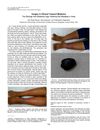 1 citations,
July 2023 in “Cancers”
1 citations,
July 2023 in “Cancers” Skin side effects from CDK4/6 inhibitors in breast cancer patients are generally mild and treatable, allowing most patients to continue treatment.
 1 citations,
October 2021 in “Cureus”
1 citations,
October 2021 in “Cureus” Platelet-rich plasma treatment may safely and effectively reduce skin lesions in psoriasis and atopic dermatitis.
March 2024 in “Current issues in molecular biology” Personalized medicine in dermatology uses molecular biomarkers to improve diagnosis and treatment but needs further advancements for practical use.
 47 citations,
May 2002 in “Journal of Cutaneous Medicine and Surgery”
47 citations,
May 2002 in “Journal of Cutaneous Medicine and Surgery” Pregnancy can cause normal skin changes that usually go away after childbirth and don't need treatment.
 7 citations,
December 2021 in “Curēus”
7 citations,
December 2021 in “Curēus” Breast cancer skin metastases are rare, look different, and can be confused with other skin issues, so a biopsy is needed for accurate diagnosis.
 5 citations,
January 2014 in “Hospital pharmacy”
5 citations,
January 2014 in “Hospital pharmacy” Using a strong allergy medicine too often on the scalp can cause swelling and inflammation.
 November 2021 in “American Journal of Tropical Medicine and Hygiene”
November 2021 in “American Journal of Tropical Medicine and Hygiene” Marking nuts can cause skin irritation and allergies.
 10 citations,
January 2010 in “Acta dermato-venereologica”
10 citations,
January 2010 in “Acta dermato-venereologica” Light therapy can effectively treat vitiligo and hair loss caused by a specific medication.
 66 citations,
June 2018 in “British Journal of Dermatology”
66 citations,
June 2018 in “British Journal of Dermatology” European guidelines recommend regular eye and ear exams, skin care, vitamin D supplements, and cautious use of medications for managing congenital ichthyoses.
 1 citations,
January 2015 in “Side effects of drugs annual”
1 citations,
January 2015 in “Side effects of drugs annual” The document concludes that various dermatological treatments and drugs can cause skin reactions and side effects.
 23 citations,
July 2021 in “Advances in Therapy”
23 citations,
July 2021 in “Advances in Therapy” Most people with Alopecia Areata don't get treatment within a year; it's costly and often comes with other health issues.
 88 citations,
July 2014 in “Journal of the American Academy of Dermatology”
88 citations,
July 2014 in “Journal of the American Academy of Dermatology” Targeted cancer therapies often cause skin reactions, so dermatologists must manage these effects.
 5 citations,
May 2017 in “Journal of the European Academy of Dermatology and Venereology”
5 citations,
May 2017 in “Journal of the European Academy of Dermatology and Venereology” The study found no significant difference in stress hormone levels between people with alopecia areata and healthy individuals, suggesting that the disease is not caused by an overactive stress response system.

Use the least toxic, most specific treatments for skin diseases, considering side effects and individual patient needs.
 2 citations,
September 2021
2 citations,
September 2021 The COVID-19 pandemic increased the use of teledermatology to treat skin conditions in low-income areas, despite challenges like poor photo quality.
 55 citations,
July 2013 in “Dermatologic therapy”
55 citations,
July 2013 in “Dermatologic therapy” Some dermatological medications can impair male fertility, so consult a doctor before trying to conceive.
 48 citations,
October 1996 in “Dermatologic clinics”
48 citations,
October 1996 in “Dermatologic clinics” Some treatments can help with hair regrowth in alopecia areata, but results vary and long-term use is often needed without changing the disease's outcome.
 15 citations,
January 2016 in “Dermatologic Clinics”
15 citations,
January 2016 in “Dermatologic Clinics” Start acne treatment early to prevent scarring, consider antibiotic resistance, use maintenance therapy, and manage side effects carefully.
 4 citations,
September 2014 in “Elsevier eBooks”
4 citations,
September 2014 in “Elsevier eBooks” Use some skin medications with caution during pregnancy; avoid strong steroids, certain eczema treatments, and systemic retinoids, but many topical treatments and nasal sprays are safe.

COVID-19 can cause skin problems and affect dermatology treatments, with recommendations for skin care and cautious use of certain drugs.
 May 2023 in “Elsevier eBooks”
May 2023 in “Elsevier eBooks” Systemic immunotherapies are used for immune-related hair loss but not usually for genetic hair loss, unless the patient has both conditions.
 June 2011 in “Oncology times”
June 2011 in “Oncology times” Dr. Mario Lacouture recommends preventive and specific treatments for skin side effects caused by EGFR inhibitors to improve patients' quality of life.
 7 citations,
October 2019 in “Annals of palliative medicine”
7 citations,
October 2019 in “Annals of palliative medicine” New targeted cancer drugs can cause skin side effects, and managing them requires patient education and timely care.
 January 2024 in “The Indian Veterinary Journal”
January 2024 in “The Indian Veterinary Journal” A young goat with skin issues improved with medication and supplements.
 October 2016 in “Elsevier eBooks”
October 2016 in “Elsevier eBooks” Common noncancerous skin diseases have various treatments, including topical applications, light therapy, surgery, and medications, with psychological support being important.
 4 citations,
August 2016 in “JEADV. Journal of the European Academy of Dermatology and Venereology/Journal of the European Academy of Dermatology and Venereology”
4 citations,
August 2016 in “JEADV. Journal of the European Academy of Dermatology and Venereology/Journal of the European Academy of Dermatology and Venereology” Using cetirizine on the skin and taking vitamin D can help increase hair growth in children with hair loss from ectodermal dysplasia.
 November 2016 in “Faridpur Medical College Journal”
November 2016 in “Faridpur Medical College Journal” Betamethasone oral mini-pulse therapy showed good or fair results in treating lichen planus.
 1 citations,
July 2022 in “Functional foods in health and disease/Journal of functional foods in health & disease”
1 citations,
July 2022 in “Functional foods in health and disease/Journal of functional foods in health & disease” Taking a probiotic supplement twice a day improved hair growth, skin hydration, and metabolic health in adults at risk of metabolic syndrome.
 41 citations,
September 2007 in “Pediatric emergency care”
41 citations,
September 2007 in “Pediatric emergency care” Oral medication is necessary to treat scalp fungus in children, with griseofulvin being the usual choice.
9 citations,
July 2022 in “Journal of Clinical Oncology” Oral paclitaxel plus encequidar improved tumor response and caused less neuropathy but more serious infections than intravenous paclitaxel.



























